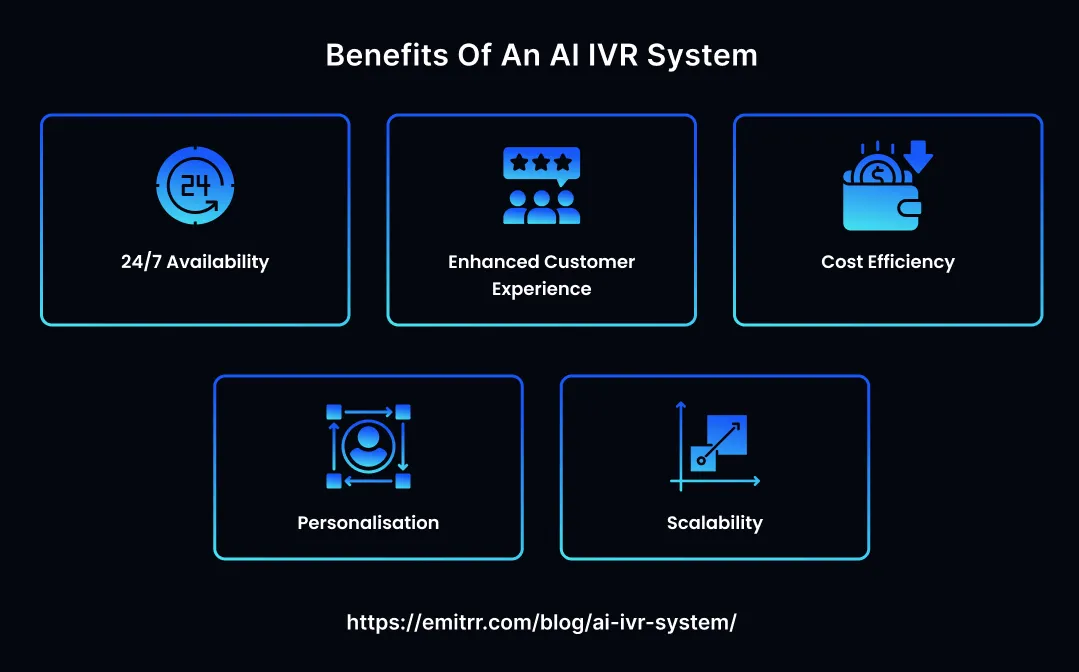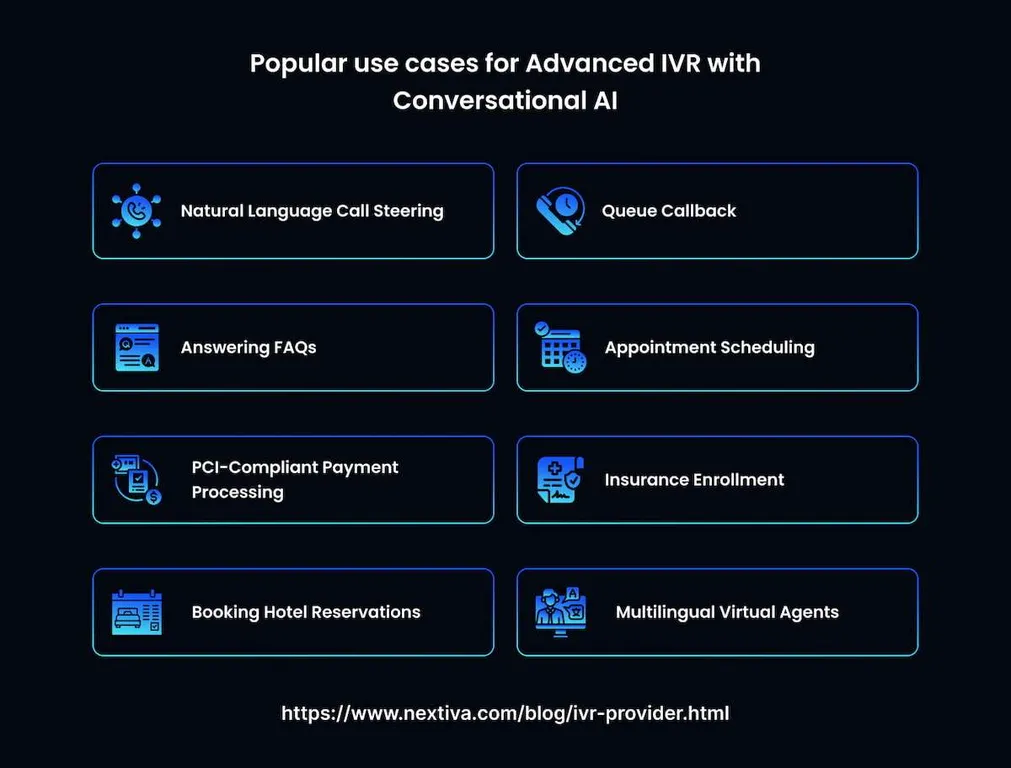Enterprises seek to ensure high customer satisfaction and deploy algorithm-based interactive voice response (IVR) systems to optimize their workflows. This approach allows them to solve clients’ queries without delays. Unlike traditional software, such tools are built to maintain human-sounding conversations and accurately interpret a person’s intent. This guide will explore the potential upsides of deploying conversational IVR (CIVR) solutions and consider how businesses use them to optimize their processes and achieve sustainable growth.
What is Conversational IVR?
CIVR uses speech recognition and artificial intelligence (AI) technologies to solve queries more efficiently than traditional systems. When one calls the customer support, they can formulate their questions in their own words and get a relevant response in no time.
The traditional solutions were less efficient than the CIVR ones. With the development of phone technology, enterprises started to deploy automated systems designed to route phone calls. When an individual called a business, they got routed to an agent who could solve their problem with high efficiency. Clients could also choose the most suitable options for their situation using the keypad. However, IVR bot solutions became too cumbersome to use when consumers started to face more complex issues.
Pre-recorded IVR replies may sound flat and devoid of any emotions. When a person cannot find a suitable option, they get connected to a human agent. It results in long wait times and lower satisfaction. CIVR systems understand the nuances of each query and generate appropriate responses. They recognize customer intent and offer solutions in an automated mode. It allows companies to reduce their agents’ workload and provide personalized support services.
Companies embrace digitization and integrate automated CS solutions to meet clients’ expectations. They deploy AI-based CIVR tools to create customer profiles and communicate with buyers across multiple channels.
Why Implement Conversational IVR?
Enterprises seek to optimize resource usage and provide personalized support to build stronger relationships with clients. Here are the main reasons to utilize CIVR in business:
- Reducing average resolution times. CIVR tools help contact centers solve most problems during the first call.
- Optimizing routine. Companies deploy CIVR to reduce agents’ workload and minimize expenses.
- High-quality support. Automated bots process simple queries independently. It allows agents to focus on high-priority tasks. This approach permits CS teams to handle increased volumes of queries.
- Valuable insights. CIVR also allows enterprises to collect and analyze important information about their clients. It enables them to discover how to improve the quality of their products and services.
- Omnichannel support. CIVR delivers an augmented customer experience. AI bots have higher flexibility than traditional tools and can handle questions independently.
Enterprises build and integrate CIVR tools to process queries without delays. Even though such solutions require significant investments, they allow ventures to achieve higher sustainability in the long term.
How Does CIVR Work?
Such systems utilize conversational AI to generate replies in real time. Companies use them to create a personalized client experience. They provide support in multiple languages, provide context-relevant interpretations, and detect sentiment with ease. AI bots utilize NLP to understand the meaning of a customer’s message. They have advanced Natural Language Understanding (NLU) capabilities. It allows them to recognize a client’s intent. Finally, NLP technology helps digital assistants to provide comprehensive responses.
CIVR systems follow these steps:
- Interpretation. AI bots translate the meaning of a query and determine the language a user utilizes.
- Intent analysis. NLU helps digital helpers to understand why a request was sent.
- Response generation. NLU allows bots to provide helpful responses and answer their queries.
- Maintaining coherent conversations. Conversational AI solutions engage clients in natural conversations.
- Algorithm update. Conversational IVR relies on ML technology. It enables such tools to improve their algorithms and deliver better performance.
AI software allows firms to make their CS teams more customer-friendly, process increased volumes of queries during peak times, and save money.
Benefits of Conversational IVR for Businesses

Ventures implement CIVR to improve the quality of their phone support. Here are the main upsides to deploying such solutions:
- Natural conversations. Clients do not need to repeat their questions or formulate queries in a specific way to be understood.
- Value for money. Even though implementing it may require significant investments, CIVR allows ventures to save on customer support expenses. Companies deploy them to provide 24/7 services at a fraction of the cost. It permits them to scale up their operations and avoid bloating their staff.
- Client-centric approach. Firms utilize CIVR to offer support across various channels. It helps them provide personalized services and enhance client satisfaction.
- Prompt responses. Customers no longer need to browse long menus trying to find a suitable option. Algorithmic bots generate comprehensive responses and route complex cases to human agents. They solve simple issues faster than regular employees.
- Increased scalability. Companies that want to set a foothold in foreign markets deploy intelligent IVR tools to provide support in multiple languages and generate responses while taking into account cultural context. It allows businesses to communicate with potential clients and existing customers in their native language.
- Dynamic responses. Due to the integration of AI bots with CRM systems, ventures personalize interactions with clients, identify pain points, and improve customer journey.
AI systems connect consumers with agents who have the right expertise in a specific area or solve their queries independently using information stored in high-quality databases.
How to Implement Conversational IVR
Even though CIVR cannot fully replace call center agents, such systems can significantly reduce workload. They have high ROI, which makes them an appealing option for enterprises seeking an opportunity to reduce their spending and maximize returns. Conversational IVR tools enable ventures to handle high call volumes and satisfy clients’ needs. Deploying such solutions requires one to follow several steps:
- Setting goals. A venture should understand why it needs to use CIVR. It might need to improve client satisfaction, minimize wait times, or build an efficient self-service portal.
- Focusing on the main use cases. A firm needs to prioritize automating simple queries to make the most out of CIVR. Conversational AI solutions are suitable for assisting clients with payments, providing information about products, scheduling appointments, and performing other routine tasks.
- Mapping conversations for each scenario. Firms use historical data to visualize the most likely dialogues and ensure the accuracy of the system’s responses. GenAI tools extract data from past conversations and generate efficient workflows for every scenario.
- Choosing the most reliable NLP and speech recognition solutions. It allows CIVR systems to maintain professional communication.
- Testing the system. CIVR tools require regular testing and fine-tuning. Ventures gather feedback about their performance and optimize it to improve conversations. Many firms trust reliable third-party providers with testing their software and updating it when it becomes necessary.
- Analyzing performance indicators. Companies should focus on average response time, client satisfaction, and resolution rates. It allows them to assess the system’s performance and discover the areas requiring improvement.
- Consider feedback. It enables firms to discover potential pain points and improve the efficiency of their conversational IVR systems.
Enterprises need to update their software regularly to address operational challenges and adjust strategies depending on client behavior.
Conversational IVR Business Use Cases

Legal firms have already started to implement smart IVR systems to manage increased call volume without hiring many CS agents. It ensures that every client will receive a reply even during busy times. A digital receptionist can provide them with information about the schedule and answer simple questions. Automated systems simplify CS routines, as they answer basic queries automatically, schedule consultations, and route high-priority calls to relevant experts. It enables firms to save money and avoid hiring extra receptionists.
Restaurants, bakeries, and other businesses utilize conversational IVR to answer queries about menus, order status, and work hours. In retail, such systems can be trained to provide information about deliveries.
Final Thoughts
Modern conversational IVR systems use complex large language models. Building such LLMs from scratch requires a lot of resources and extensive expertise in AI technologies. This is why many ventures outsource this task to reputable providers. Metadialog helps its clients create and deploy enterprise-level LLMs. Such models facilitate serving customers better and providing top-level services. They help businesses automate up to 81% of replies and reduce the average resolution time to 20 seconds. Contact our managers today and discover how to develop advanced LLMs to power your automated phone support system.
